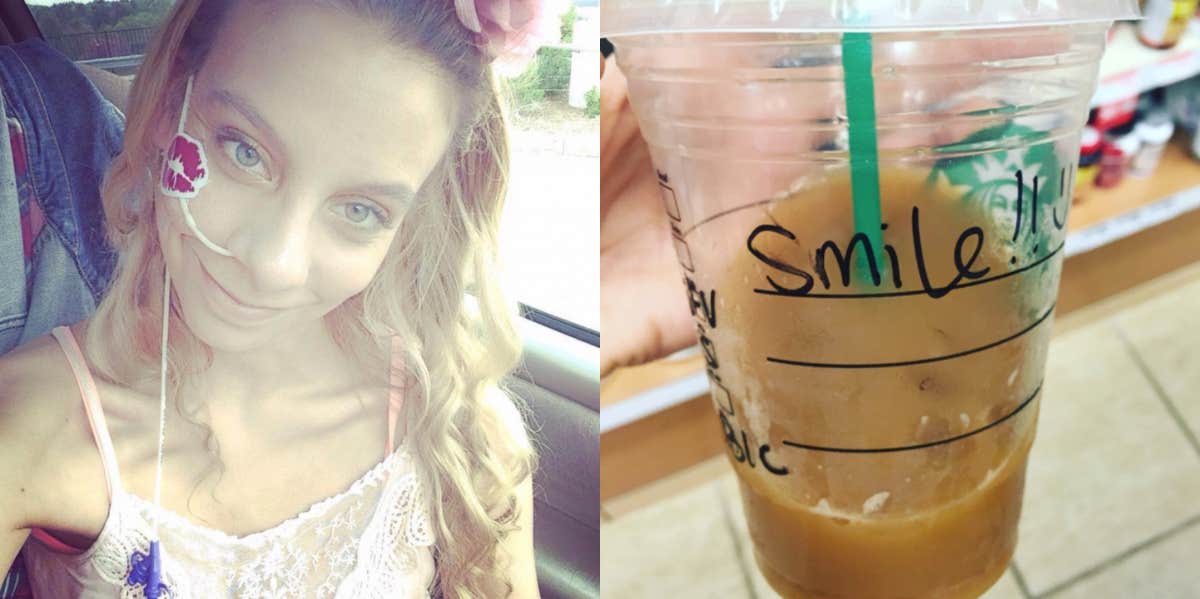Woman Thanks Starbucks Barista Whose Note On Her Cup 'Changed My Day & Possibly My Life'
A small act of kindness can be truly life-changing.
 Bekah Georgy
Bekah Georgy A woman in the midst of a hopeless day was offered a small, simple kindness from an employee at a coffee shop that changed her forever.
Bekah Georgy of New Hampshire thanked the person who showed her compassion, allowing her to have more empathy for herself during a hard time.
“You didn’t know me and you didn’t know my story,” Georgy wrote. “Most importantly, you probably didn’t know writing the simple word ‘smile’ on my order would change my day for the better.”
RELATED: On The Day Of Her Wedding, A Bride Received A Gift From The Groom That Wasn't For Her
Georgy penned a letter to the Starbucks barista who wrote a ‘minuscule word’ on her coffee cup.
Georgy is a singer, dancer, and writer who battles anorexia nervosa. In 2015, she wrote to the barista who turned a hard day around, saying, “You wouldn’t know that behind this plastered smile is a girl who has broken and fallen to pieces.”
“You wouldn’t know this girl had so much self-hate, she starved herself for over half her young life. Or that she’s tried to end her own life five times,” Georgy acknowledged.
'You were just going about your job, unaware that writing a minuscule word on my drink would change my day and possibly my life,' she wrote.
The Mayo Clinic defines anorexia nervosa as an eating disorder characterized by a person struggling to maintain an appropriate body weight for their height, age, and stature. Those with anorexia nervosa often restrict their calorie intake and the types of food they eat.
The National Association of Anorexia Nervosa and Associated Disorders reports that 9% of the U.S. population, or 28.8 million Americans, will have an eating disorder in their lifetime and less than 6% of people with eating disorders are medically diagnosed as “underweight.” Eating disorders are among the deadliest mental illnesses, second only to opioid overdose.
Allison Chase, the regional managing clinical director of the Eating Recovery Center, notes that eating disorders are caused by both physiological and environmental factors.
Anorexia nervosa affects people across gender, racial, and class divisions.
NEDA found that men represent 25% of individuals with anorexia nervosa. They’re at a higher risk of dying, in part because they’re often diagnosed later on in the course of their illness since our society upholds the stereotype that men can’t have eating disorders.
People with larger bodies can also suffer from anorexia nervosa, though they’re often underdiagnosed due to cultural prejudices and fatphobia.
For Georgy, who’s battled the eating disorder for years, the compassion offered to her by a stranger was enough to lift her mood and alter how she approached life.
“Maybe you wrote ‘smile’ on my drink because you saw the feeding tube. Or maybe you could see past my fake smile because you’ve been where I am,” Georgy noted. “Either way, I’m grateful. You didn’t have to make my order special.”
“But you took that extra second to add some positivity to a life that’s been filled with so much negativity lately.”
The honesty and openness Georgy expressed in her letter to the unknown barista showcase her strength in a difficult world.
If you or someone you know is battling an eating disorder ANAD’s free, eating disorders Helpline is available to provide emotional support and referrals at 1 (888)-375-7767.
Alexandra Blogier is a writer on YourTango's news and entertainment team. She covers celebrity gossip, pop culture analysis and all things to do with the entertainment industry.
